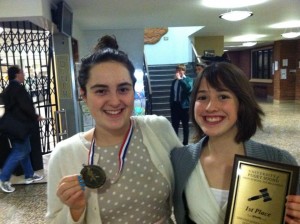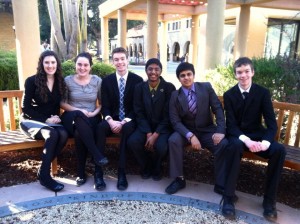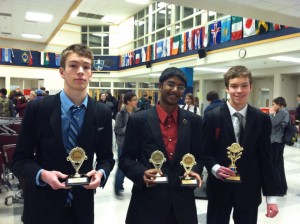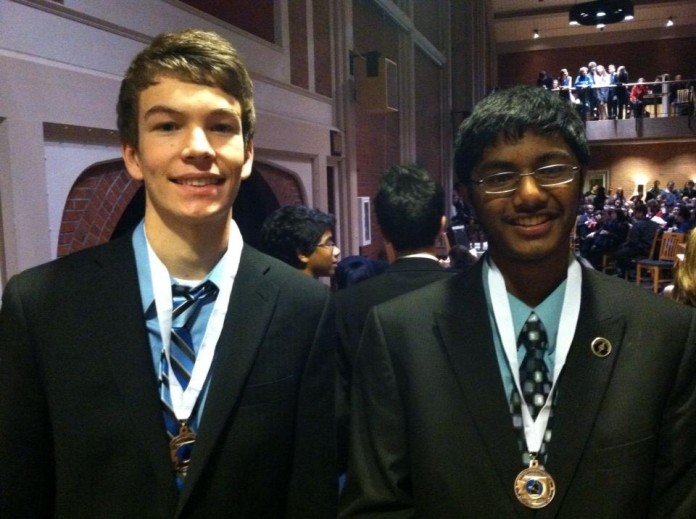By Claire Smith, Capital High School intern to ThurstonTalk.com
“You can grab a doughnut and leave, if that’s why you’re here.”

That’s how the students interested in Capital High School debate club are greeted by advisor Mr. Anderson. It’s eight a.m. on a Wednesday, the traditional late start day. Most of the room is half asleep. Some are on their phones, others chat, several even look around room B-7, wondering where the food is so they can grab it and go.
Mr. Anderson is an English teacher at Capital and Debate President. Last year, seven people showed up to the first meeting. This year, with the promise of doughnuts and churros, the room is packed. All the desks are full, and several people stand.
His words shock the room for a moment, before some people shamefully get up, take food, and leave. The room is still full, though. The people that are interested in the club remains a record high.
The air in the room quickly relaxes from the shock, and once again becomes friendly. Mr. Anderson starts his speech and reassures nervous newbies that they don’t need to compete to be part of debate, but that’s where most of the practice will be directed. The practices are after school, Tuesday, Wednesday, and Thursday. “This way, you are welcome to be in other clubs,” Mr. Anderson says, “because then debate isn’t just a club, it’s an activity. And then, we can work around sports and other clubs to find a time that works for you. We really want you to be a part of the team, whatever it takes.”
Debate has been at Capital High School for many years. The requirements are simple. Pay your ASB fee, attend practice, look spiffy, bring food, and, as always and most importantly, have fun.

The room fills out notecards with their name, grade, and availability. The club officers introduce themselves and talk about how debate has helped them as do senior members. They all seem to reach an agreement on the major perks of debate. It makes you a fantastic public speaker and writing essays in classes takes less time after enough experience. Mr. Anderson embellished on the confidence aspect of debate, and stated, “They (the senior members) can talk to you as total strangers, and that’s one of the best things debate does. It’s an excellent confidence booster.” One of the members even quips, “Boys, it’ll get you ALL the ladies.”
There are many different types of debate. Would you rather have your speech memorized, on notecards, or made up on the spot? Students can work in pairs in Public Form, or alone in Lincoln-Douglas. Or would you rather prepare a speech on the spot about a random word or quote in six minutes flat in Impromptu? Or maybe you’re more of the type that enjoys drawing the meaning, or humor, out of reading. That’s what Interpretive Reading and Humorous Interpretation is for. There are eleven categories that all contain different ideas and rules. The best part is that you get to choose the group that suits you.
After information is passed out, Mr. Anderson explains one of the forms of debate; sparing. It’s a rarer event, where the opponents walk into the room, receive a topic, and then go one-on-one against each other. The competitors have no idea what the topic is until they begin. They are timed, and often have to improvise on the spot. At the end of the spar, they have to summarize their arguments.
Two older boys, Max and Max, step up to the plate and are asked if it is ethical to eat a doughnut given to you by a club that you have no intention of joining. While persuasive arguments were made on both sides, (such as America is a free country and that you are technically robbing the club) the room decides that it’s defiantly not right to take the doughnut. Even if it’s a free country, you shouldn’t take a doughnut under false pretenses.
CHS debate has been successful for many years. They compete at the regional, state, and national level. They are also members of the Washington State Forensic Association and the National Forensic League. They’ve also sent students to the national tournament in Kansas City.

There are ten minutes left before school starts and the debate meeting ends. This is when the public speaking aspect comes in. The basis is a Press Conference. Once again, two older members are involved (one of the previous Max’s and another named Alex.). They leave the room while the rest of the participants decide what their topic will be. We reach an agreement, that the boys have taken over a doughnut factory and are holding doughnuts as hostages. When the boys return, they give a brief reason why they did the terrible crime, though they are not aware of what they have done. The room fills with laughs as the boys try to answer questions shot at them the best they can. We learn that they had seventy four hostages, but ate one, plan to turn the rest into slaves, and their motive was hunger. Right before the bell rings, Mr. Anderson reveals to Max and Alex that they took over the doughnut factory, laughter erupts from the room. Is there a better way to end a first meeting?
Debate is held at room B-7, after school until four p.m. each Tuesday through Thursday. The first meet of a very promising year will be on October 25 and at Gig Harbor High School. If you have any questions about joining Capital High School debate, don’t hesitate to visit room B-7 to talk with Mr. Anderson.





















































